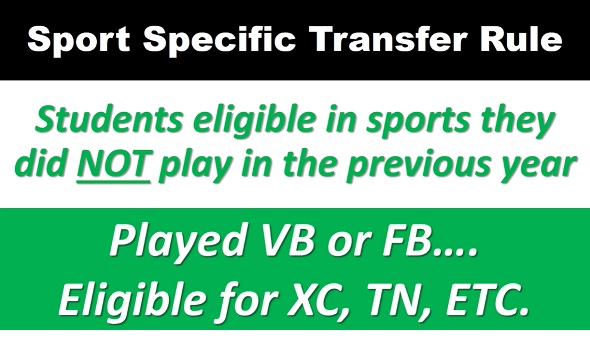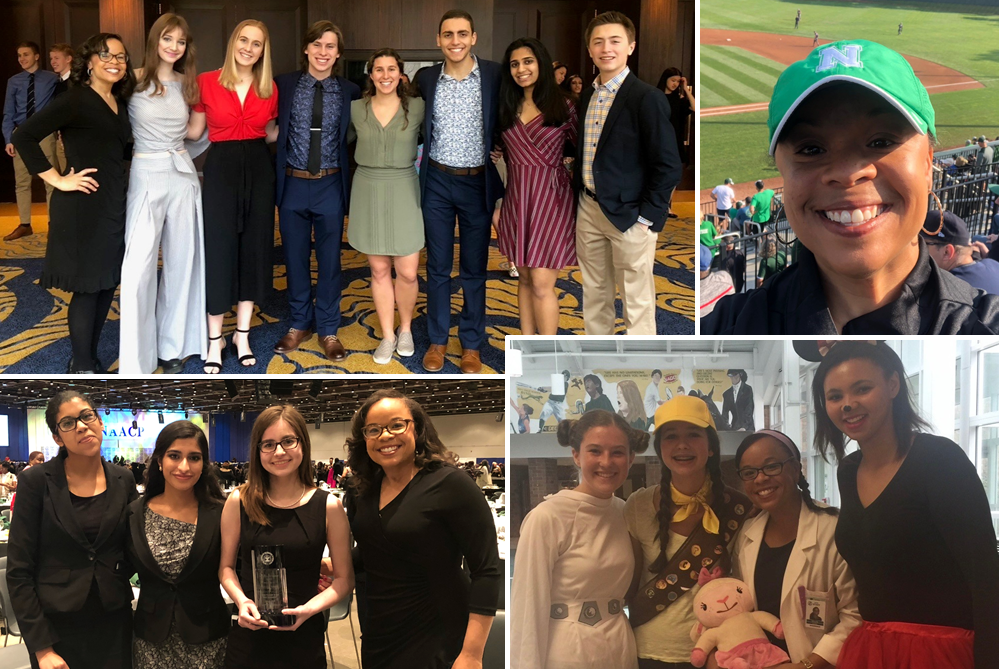
Brush Up on the New Transfer Rule
July 18, 2019
By Rob Kaminski
MHSAA benchmarks editor
Eligibility under the new “sport-specific” transfer rule begins this coming fall after circulating extensively for nearly one school year.
Unless one of the stated 15 exceptions is met, participation during the 2018-19 school year determines eligibility for 2019-20.
The new rule adopted by the Representative Council at its May 2018 meeting has found support among most audiences. A transfer student’s eligibility in 2019-20 is based upon that student’s participation from this past school year (2018-19). It will be paramount for administrators and coaches to have awareness of the sports a transfer student participated in during the previous school year.
The long-standing 15 Exceptions to immediate eligibility, such as a full and complete residential change or a student moving between divorced parents by completing of an Educational Transfer Form, did not change.
One might call the rule on the way out “The Fourth-Friday Transfer Rule.” Under this old rule, when a student enrolled at the new school determined his or her eligibility. Under the new Sport Specific Transfer rule, what a student played in the previous season determines eligibility.
The Council passed a more lenient rule on the one hand and more restrictive on the other. The more lenient aspect is a change that finds a transfer student ELIGIBLE in any sport in which he or she did not participate in a game or a scrimmage in the previous school year.
The more restrictive portion tends to discourage students who change schools for sports reasons. A transfer student who did play a sport in the previous season – and who does not meet one of the 15 Exceptions – is NOT ELIGIBLE in that sport for the next season. If a student changes schools in mid-season, the student would be ineligible for the rest of that season in that sport and the next season for that sport.
Participation under this and other rules means playing in an interscholastic game or scrimmage after starting the 9th grade at any high school. It does not mean practice, but entering an interscholastic game, meet or scrimmage in any way. It also may involve more than one sport, so a three-sport athlete who does not have a residential change and transfers would be ineligible in those sports during the next school year – but eligible for any other sport. It also means a student cut from a team – one who never entered a scrimmage or game – may transfer and play without delay for that new school’s team. It may also mean that a student who meets one of the stated exceptions such as a residential change but enrolls in a school other than her or his school of residence, would have eligibility in sports not played in the previous year.
The new rule will tend to discourage students from changing schools for sports because they would be ineligible in any sport they have played in school the previous season for that sport. It will increase participation for some students who were otherwise not eligible under the current rule.
It is always best to contact school athletic directors who can connect with the MHSAA to verify eligibility prior to enrollment.
If the student’s new school requests in writing, the MHSAA Executive Committee may approve a waiver that reduces the period of ineligibility to 90 scheduled school days at the new school if the change of schools was for compelling reasons demonstrated with outside documentation having nothing to do with sports, curriculum, finances, and school demographics. The Executives Committee also has authority to approve immediate eligibility.

Novi Principal, Past MHSAA Council VP Carter to Receive Inaugural Hampton Award
By
Geoff Kimmerly
MHSAA.com senior editor
March 4, 2024
Nicole Carter grew up in a family of educators, aspired to become one herself, and has dedicated her career to providing opportunities in all facets of education – including educational athletics – to all students through her vision and inspiration. To celebrate Carter’s continuing contributions especially to underrepresented groups in school sports, she has been selected as the inaugural honoree of the Michigan High School Athletic Association’s Nate Hampton Champion of Progress in Athletics Award.
The Hampton Award was created by the MHSAA’s Representative Council to honor Nate Hampton, who retired in 2021 after serving in education and educational athletics for 50 years, including the last 32 years as an MHSAA assistant director. Honorees have championed the promotion and advancement of opportunities for women, minorities and other underrepresented groups within interscholastic athletics, while serving as an administrator, coach, official, educator or school sports leader in Michigan.
Carter, in her 10th year as principal at Novi High School, was selected as the first recipient of the Hampton Award by the Representative Council at its Fall meeting in December and will be recognized during the Boys Basketball Finals on March 16 at Michigan State University’s Breslin Center.
“As an advocate and strong proponent of athletics, I understand wholeheartedly the impact they have on the whole child,” Carter said. “This is a surreal moment for me, and I’m truly honored to be the recipient of this award, keeping in mind the impact Nate Hampton had on athletics in the state of Michigan over several decades – it’s very humbling.”
Carter began at Novi in 1999, teaching for eight years before moving into administration as dean of student activities for three years and then assistant principal for three. She became principal with the 2013-14 school year and leads a staff of 140 in educating more than 2,100 students.
While leading one of the state’s largest and most highly-regarded high schools – and one of Michigan’s most diverse, with her students’ families speaking more than 70 languages at home – Carter has provided her expertise through several more efforts. She served four years on the MHSAA Representative Council, from 2019-23, and as its vice president for the 2022-23 school year. She has served on the MHSAA’s Sports Medicine Advisory Committee, and volleyball and classification committees, and presented at the annual Women In Sports Leadership Conference on social and emotional skill building. She also has served as president of the Kensington Lakes Activities Association.
“Nicole Carter serves with the mindset of providing opportunities for all students as the principal at one of the largest and most diverse high schools in Michigan, and students statewide benefitted from her leadership during her time as part of the Representative Council and Executive Committee,” MHSAA Executive Director Mark Uyl said. “No matter the topic or details of a situation, Nicole looks at it from a rational point of view in deciding what’s best for kids. She continues to emphasize that academics must be the highest priority in a student’s education, and she can provide that perspective with a wider lens as someone with a strong background in and understanding of the role of athletics.”
Service through education is a tradition in Carter’s family. Her grandfather Charles Butler Nuckolls served as a principal in Kentucky for 40 years prior to desegregation. Her father Gene Nuckolls also spent 40 years in education, including as principal of Saginaw High School and assistant superintendent for Saginaw Public Schools, while Carter’s mother Shirley Nuckolls dedicated 40 years as a teacher, assistant principal and guidance counselor within the Saginaw district.
Carter’s selection for the Hampton Award is something of a full-circle moment for her family. Gene Nuckolls hired Hampton as supervisor of athletic and physical education for Saginaw Public Schools in 1987.
Carter was named Michigan High School Principal of the Year in 2022 by the Michigan Association of Secondary School Principals (MASSP) and Michigan Association of Student Councils and Honor Societies (MASC/MAHS). She additionally has been recognized as a Diversity Champion as part of The Community House honor roll recognition program, and was selected as an African American Educator of the Year by the Michigan Lottery in 2016. She also was recognized in 2017 by the Oakland County Coordinating Council Against Domestic Violence.
Drawing from her athletic background and perspective, Carter noted that she strives to be a coach and mentor – as well as a teacher of teachers and students as principal at her school.
She also has continually looked to create inclusive opportunities during her tenure, citing Novi’s Special Olympics Unified Sports program as a significant point of pride for the school.
“I always lead from the lens of equity and inclusion and accessibility, and I’m always trying to identify opportunities for students to find their place,” Carter said. “Ensuring every single student in our school has a sense of belonging is one of my top priorities as principal.”
Carter is a 1993 graduate of Saginaw Heritage, where she played basketball, soccer and softball. She earned bachelor’s degrees in political science, with a minor in English, and secondary education from Michigan State University in 1999 and her master’s in curriculum and instruction from MSU in 2001. She also has an educational leadership degree from Oakland University. Carter taught civics/economics and U.S. government and politics at Novi before moving into administration.
PHOTOS courtesy of Novi Community School District.

